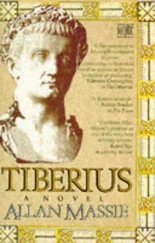Allan Massie - Nero_s Heirs
Здесь есть возможность читать онлайн «Allan Massie - Nero_s Heirs» весь текст электронной книги совершенно бесплатно (целиком полную версию без сокращений). В некоторых случаях можно слушать аудио, скачать через торрент в формате fb2 и присутствует краткое содержание. Жанр: Исторические приключения, на английском языке. Описание произведения, (предисловие) а так же отзывы посетителей доступны на портале библиотеки ЛибКат.
- Название:Nero_s Heirs
- Автор:
- Жанр:
- Год:неизвестен
- ISBN:нет данных
- Рейтинг книги:3 / 5. Голосов: 1
-
Избранное:Добавить в избранное
- Отзывы:
-
Ваша оценка:
- 60
- 1
- 2
- 3
- 4
- 5
Nero_s Heirs: краткое содержание, описание и аннотация
Предлагаем к чтению аннотацию, описание, краткое содержание или предисловие (зависит от того, что написал сам автор книги «Nero_s Heirs»). Если вы не нашли необходимую информацию о книге — напишите в комментариях, мы постараемся отыскать её.
Nero_s Heirs — читать онлайн бесплатно полную книгу (весь текст) целиком
Ниже представлен текст книги, разбитый по страницам. Система сохранения места последней прочитанной страницы, позволяет с удобством читать онлайн бесплатно книгу «Nero_s Heirs», без необходимости каждый раз заново искать на чём Вы остановились. Поставьте закладку, и сможете в любой момент перейти на страницу, на которой закончили чтение.
Интервал:
Закладка:
At first, he was uncertain whether the Eastern army would prefer to be commanded by him or by Mucianus. The prefect of Egypt, Julius Alexander, made no secret of his belief that Mucianus should be the one to be proclaimed Emperor. And Mucianus was more popular with the legions. They respected Vespasian as soldiers always respect a general who is careful of their lives in battle. But they loved Mucianus, as soldiers love a debauched commander who nevertheless is a favourite of the god of war. For them, Mucianus, with his little dogs and the painted boys of his entourage was a 'character' – a 'card', as they put it. They would have loved to make him Emperor, and to sing lewd songs in his triumph.
But Mucianus wasn't playing. He had two reasons for disclaiming the opportunity to wear the purple. First, he was lazy. He simply couldn't see himself burdened with the administration of Empire and, since he was both intelligent and dutiful enough to know that any Emperor who neglects the business of government is contemptible, he retained, despite his many vices, a fierce pride. Second, he was childless. It was said that he had never lain with a woman, and I believe this to be true, even though he was actually married once at least, perhaps twice. But he professed a dislike for the female shape and also, he said, for the smell of women. Since he had no heir, he gave not a hang for posterity.
That wasn't all. Mucianus adored Titus. I believe they were, briefly, lovers, though Titus once denied this when I taxed him with it. Of course, even if they had been so, they were no longer. By this time Titus was too old for Mucianus, who delighted in beardless boys. Yet he still adored Titus, and couldn't look on him without reviving the memory of his old desire. And he was charmed by Titus' bearing, looks, wit, and intelligence. Therefore he said to Vespasian, 'If I was chosen as Emperor, the first thing I would do would be to adopt your darling Titus as my heir. Since he's already yours, that seems to me to be peculiarly unnecessary, my dear. Titus will be Emperor, the gods willing and our arms favoured, whichever of us first wears the purple. So it makes sense that that should be you. His gifts should assure him of respect – that respect which an Emperor needs and which has been accorded to none since Tiberius. But his succession will be the more assured and uncontroversial if he follows his natural father rather than being the adopted heir of one whose manner of life will persuade many that he chose Titus because the boy was once the recipient of what they will term his shameful attentions.'
He laughed at the thought. But I have it on good authority that his manner of speaking made Vespasian for the first time wonder whether his son had in fact been his colleague's lover. Nevertheless he couldn't but be pleased that Mucianus was so fixed in his determination to make him Emperor.
And he immediately gave proof of this when he persuaded, or compelled, Julius Alexander to transfer his support to Vespasian. That was of the first importance for, as you will no doubt remind your readers, whoever holds Egypt holds Rome to ransom, by reason of his control of the grain trade.
So in any long war the control of Egypt secured Vespasian an advantage.
Yet, even now, though word had come that Vitellius was established on the Palatine, Vespasian hesitated to allow himself to be proclaimed as Emperor. To his mind, he could not move till he had assured himself that the legions stationed on the Danube favoured his cause.
Here he had a stroke of fortune. One of the last acts of Nero, or rather of his ministers, for Nero did not care to trouble himself with such matters, had been to transfer the 3rd (Gallia) legion to the Danube frontier. This legion had formerly been commanded by Vespasian, had won honours then, and held him in high esteem. So its officers set themselves to persuade the commanders of the other Danube legions that only Vespasian could rescue the Empire from contempt and the curse of civil war.
However, Mucianus also advised Vespasian that they should send emissaries from their legions to Rome, to inform Vitellius that all the legions of the East had sworn allegiance to him.
'In this way,' he said, 'we shall gain the advantage of a few weeks. If I know Vitellius, he will believe what he wants to believe, slacken his vigilance, and devote himself to pleasure.' This indeed proved to be the case.
But the same emissaries also brought, secretly, letters from Vespasian to his brother Flavius Sabinus, urging him to waste no time in organising support for him in Rome, and they also brought a letter from Titus to me. Domitian again expressed his displeasure and disappointment that neither his father nor his brother had thought to write directly to him. Even then, I thought he had just cause for grievance, and so I did not tell him that Titus had written to me. I could not in any case have shown him the letter, partly because Titus was never willing to share information concerning their father's plans with Domitian, partly because the affectionate terms in which the letter was couched would have aroused Domitian's fierce jealousy.
Flavius Sabinus now insisted that Domitian should not remain in virtual hiding, but should show himself in public, frequent the Forum and the baths, and in general behave as befitted the son of a distinguished commander who was a loyal servant of the reigning Emperor. I am bound to say that Domitian obeyed reluctantly, and with an ill grace. He complained that he was being used, though not consulted, and said that he did not believe that his appearance in public would do anything to assure Vitellius of his father's loyalty. I daresay he was wise in this judgement. At any rate it was not long before an officer of Vitellius' personal bodyguard presented himself at the house in the Street of the Pomegranates, with an order requiring Domitian to report to police headquarters at noon every day. This was as alarming as it was insulting. Flavius Sabinus protested on his nephew's behalf, but, for some weeks, Domitian, blushing furiously and trembling with ill-concealed apprehension, did as he was bid.
Meanwhile, as Titus had forewarned me, events marched in the East. The prefect of Egypt, Julius Alexander, proclaimed Vespasian Emperor on the first day of July, and made the legions stationed there take an oath of allegiance. All had been well prepared, and there were no dissenters. Two days later the legions in Judaea followed suit, even though their commander Titus was still travelling back from Antioch where he had been consulting with Mucianus. They did this therefore spontaneously (or so it was later given out), hailing Vespasian as Caesar and Augustus. But I believe this acclamation was not unprompted.
Mucianus now declared himself in Antioch, as he and Titus had agreed he should. The soldiers were eager to swear their allegiance to Vespasian. But Mucianus also wished to attach the provincials to the cause, no doubt in the knowledge that they would have to be taxed more heavily to pay for the campaign, and thinking that it would be better if they could be persuaded to do so willingly. So he addressed an assembly of civic dignitaries and other men of note in the theatre. He was well suited to the task, for he spoke Greek with unusual elegance and, while the Greeks are accustomed to mock those who speak their language imperfectly, they are always flattered by a Roman who has taken the trouble to learn it thoroughly.
Moreover he told them what was not true: that Vitellius had announced his intention of transferring the German legions to Syria and the Syrian ones to Germany. This alarmed and displeased the soft provincials, for they supposed that the legions long based in Germany would have acquired savage, even brutal, manners from their sojourn in so barbarous a region, while on the other hand many of them were connected by friendship or relationship to the troops quartered among them. So they were pleased to think that Vespasian would soon be established in Rome in Vitellius' place.
Читать дальшеИнтервал:
Закладка:
Похожие книги на «Nero_s Heirs»
Представляем Вашему вниманию похожие книги на «Nero_s Heirs» списком для выбора. Мы отобрали схожую по названию и смыслу литературу в надежде предоставить читателям больше вариантов отыскать новые, интересные, ещё непрочитанные произведения.
Обсуждение, отзывы о книге «Nero_s Heirs» и просто собственные мнения читателей. Оставьте ваши комментарии, напишите, что Вы думаете о произведении, его смысле или главных героях. Укажите что конкретно понравилось, а что нет, и почему Вы так считаете.












